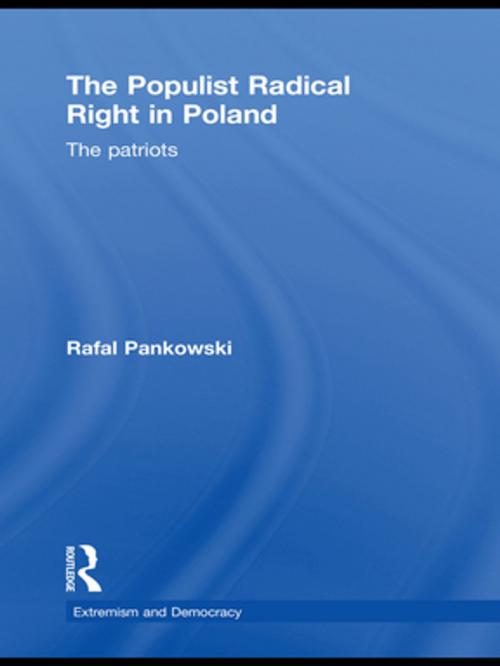The Populist Radical Right in Poland
The Patriots
Nonfiction, Social & Cultural Studies, Political Science, Government, Communism & Socialism, International, International Relations| Author: | Rafal Pankowski | ISBN: | 9781135150969 |
| Publisher: | Taylor and Francis | Publication: | February 25, 2010 |
| Imprint: | Routledge | Language: | English |
| Author: | Rafal Pankowski |
| ISBN: | 9781135150969 |
| Publisher: | Taylor and Francis |
| Publication: | February 25, 2010 |
| Imprint: | Routledge |
| Language: | English |
In this important and accessible study, Rafal Pankowski makes sense of the rapid growth of organized radical nationalism on the political level in Poland by showing its origins, its internal dynamics and the historical, political, social and cultural context that has made it possible.
From political obscurity to the heart of mainstream politics, the recent rise of the extreme right in the Polish context surprised many observers. In the 1990s Poland was usually referred to as a country without significant extremist or populist movements. It was considered to be a stable, even if young, democracy, and ‘extremists’ were perceived as just a little nuisance to the liberal-democratic consensus. By the mid-2000s, the picture changed completely, two populist radical right parties entered into a coalition government with the right-wing conservative Law and Justice Party. All of a sudden, racist extremist affiliations were not a hindrance to a high-level career, but were tolerated or even seemed positively valued. The entrance of extremists into state structures was no longer a matter of isolated individual cases, but took on systemic features.
Presenting a detailed analysis of the Polish national populism, the book will use theories of social movements (in particular the concept of discursive opportunity structure), as well as relevant theories of transition and democratization. In particular, the specific cultural resources of Polish nationalist populism are to be analyzed because they are deemed to be among principal reasons for the relative success of the radical nationalists and their particular brand of identity politics
The book not only provides a detailed analysis of Polish nationalism but will also have a much broader trans-national significance, essential reading for scholars of national populism in the context of post-communism and beyond.
In this important and accessible study, Rafal Pankowski makes sense of the rapid growth of organized radical nationalism on the political level in Poland by showing its origins, its internal dynamics and the historical, political, social and cultural context that has made it possible.
From political obscurity to the heart of mainstream politics, the recent rise of the extreme right in the Polish context surprised many observers. In the 1990s Poland was usually referred to as a country without significant extremist or populist movements. It was considered to be a stable, even if young, democracy, and ‘extremists’ were perceived as just a little nuisance to the liberal-democratic consensus. By the mid-2000s, the picture changed completely, two populist radical right parties entered into a coalition government with the right-wing conservative Law and Justice Party. All of a sudden, racist extremist affiliations were not a hindrance to a high-level career, but were tolerated or even seemed positively valued. The entrance of extremists into state structures was no longer a matter of isolated individual cases, but took on systemic features.
Presenting a detailed analysis of the Polish national populism, the book will use theories of social movements (in particular the concept of discursive opportunity structure), as well as relevant theories of transition and democratization. In particular, the specific cultural resources of Polish nationalist populism are to be analyzed because they are deemed to be among principal reasons for the relative success of the radical nationalists and their particular brand of identity politics
The book not only provides a detailed analysis of Polish nationalism but will also have a much broader trans-national significance, essential reading for scholars of national populism in the context of post-communism and beyond.















